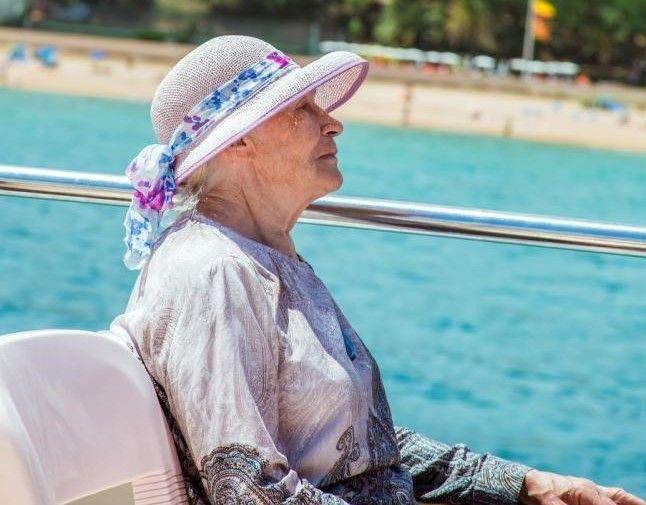Summer Safety Tips for Older Adults

Summertime is a time for fun and leisure; but for seniors, the heat and sun can be dangerous without proper precautions. Many older adults have conditions such as asthma, thyroid disease, and high blood pressure or heart problems that require some preparations to avoid overexposure to the sun. Here are some great tips that aging adults can use to make sure they have a fun and safe summer.
- Stay Hydrated
Seniors are more susceptible to dehydration than younger people because they lose their ability to conserve water as they age. They can also become less aware of their thirst and have difficulty adjusting to temperature changes. So it’s important to drink water often. Aim to have about 6 to 8 glasses of water a day. Try to avoid caffeine and alcohol or anything that could dehydrate your system.
- Apply Sunscreen & Wear a Hat
Before going outside, apply sunscreen and put on a hat. Seniors especially need extra sun protection to help keep them healthy. It’s also a good idea to gently remind loved ones about re-applying sunscreen every few hours.
- Wear Loose Fitting Clothes
As a general rule, the best fabrics for warm weather are lightweight and made from natural materials such as cotton or linen. Natural fabrics offer more comfort than synthetic fibers. Stock your summer wardrobe with light-colored and loose-fitting clothes to help feel cooler and more comfortable.
- Protect your Eyes
Vision loss can be common among seniors, and too much exposure to the sun can irritate eyes and cause further damage. Wearing sunglasses can protect your eyes from harmful UV rays and preserve your vision. Sunglasses can also slow the development of wrinkles around your eyes, delay the onset of cataracts, protect against glaucoma-related light sensitivity, and shield you from distracting glare while you drive.
- Apply Bug Spray
Seniors are particularly prone to West Nile Virus and encephalitis. If you live in areas where there are a lot of mosquitoes and where West Nile Virus is present, and if you spend a lot of time outdoors (particularly at night), use mosquito repellent to help reduce the risk of being bitten by a mosquito carrying this virus.
- Exercise Smart
When the temperature goes up in the summer months, exercising outside can become challenging. If you enjoy outdoor activities, such as walking or gardening, make sure to wear the proper clothing and protective gear. Try to avoid exercising outside in the early afternoon. It’s usually the hottest between noon and 3 p.m. It’s also important to keep track of time. Don’t stay out for long periods and make sure to drink even more water than usual when exercising.
- Keep Emergency Numbers
Everyone knows how to dial 911 in the case of an emergency, but you should also keep a list of other numbers you might need in case of summer emergencies. Some key phone numbers include your local fire department, your doctors, your local hospital, your vet (if you own pets), your insurance provider, and family members that you want to notify if you become ill.
- Know the Symptoms of a Heat Stroke
It’s extremely important to know the signs of a heat stroke.
During the summer, be particularly cautious about abnormally high body temperatures, a condition known as hyperthermia. A heatstroke is an advanced form of hyperthermia that can be life-threatening. Make sure to know the warning signs and get medical attention immediately if you or anyone you know is experiencing these symptoms:
- Body temperature greater than 104 degrees
- A change in behavior, such as acting confused, agitated or grouchy
- Dry, flushed skin
- Nausea and vomiting
- Headache
- Heavy breathing or a rapid pulse
- Not sweating, even if it’s hot out
- Fainting
Elderly individuals have a harder time knowing when they are dehydrated, and their bodies have more difficulty regulating their temperatures. As a result, older adults are more prone to heatstroke. If you (or an elderly loved one) start to feel any of these symptoms, ask for medical help and get out of the heat, lie down and place ice packs on your body.
- Stay Indoors during Extreme Temperatures
When temperatures are too high, stay indoors — ideally, as described above, in air conditioning. The most dangerous times are typically between 10 a.m. and 2 p.m. when the sun is at its hottest. When you do need to go outdoors, dress appropriately in clothing that is lightweight, loose-fitting, and light-colored. Also important: sunglasses and wide-brimmed hats.
- Properly Store Medications
The heat can have a negative effect on certain medications, so it’s a good idea to check in with your doctor or pharmacist when the temperature starts to rise. You may need to move some medications to the fridge or a cool area of the home (like the basement) to avoid spoilage and reduced effectiveness.




